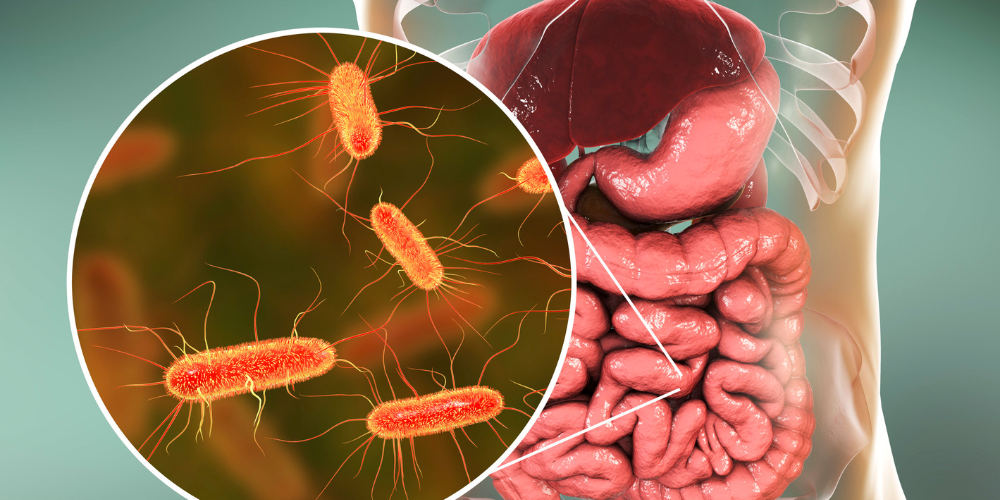What do you think might be a common trigger in eczema, frequent infections, anxiety, and joint pains? These seemingly unrelated symptoms might be manifestations of troubles in the gut, and, specifically, in the gut microbiome. You must have heard about trillions of microorganisms living in our guts. This is our gut microbiota, now considered an endocrine (or “hormone-producing”) organ. As any other organ, it has its weight, place, structure, and functions. Our microbiota weighs approximately 1.5-2kg, with the dominant part located in the large intestine. We actually have about 100 trillion microbes, which is 10 times more than human cells. Moreover, these microbes are genetically more complex than us, with over 3 million genes versus about 30,000 of human genes. The genetic material of microbes is called “microbiome” and is capable of interacting with the human genome.
The Uniqueness and Diversity of Our Microbiome
Our microbiomes are as unique as our fingerprints; even identical twins have very different gut microbiomes. This is why it is impossible to define a “healthy microbiome.” However, we do know that the gut microbiota of healthy people is composed of a large diversity of different microbial species. Like the Amazonian forest, the richer and more diverse the microbial ecosystem is, the better health outcomes it would extend to its host. The trouble starts when this diversity is lost, or when the balance between beneficial species and not-so-friendly species is off. This microbial imbalance is called “dysbiosis.”
The Role and Impact of Gut Microbes
As any other living organism, gut microbes produce a wide range of chemicals, some beneficial to humans, such as vitamins, hormones, short-chain fatty acids, and neurotransmitters, and some outright toxic, promoting inflammation and gut lining destruction. In the state of dysbiosis, the toxins produced by pathogenic microbes overwhelm the ecosystem, triggering a wide range of symptoms and diseases. Healthy and diverse microbial balance is crucial for metabolism (including weight management), control of inflammation, strong immunity, and brain health. Dysbiosis and low microbial diversity are linked to a number of health conditions, such as obesity, diabetes, neurogenerative diseases, and some types of cancer, to name a few.
Factors Affecting Microbiome
Birth
The gut health of our mother, the way we are born (c-section vs. natural birth), breastfeeding vs. bottle-feeding all affect the composition of our gut microbes in infancy. Naturally born, breastfed babies are exposed to more friendly strains, such as Lactobaccilus and Bifidobacterium.
Exposure to Nature
Living on a farm exposed to soil and animals with their own microbial worlds or in the city also impacts gut microbiota. Children born and raised in the countryside tend to have fewer allergies and asthma than children growing up in cities, partially because they were exposed to a wider variety of bugs training and strengthening their immune systems.
Antibiotics & Medication
Antibiotics have a very damaging effect on the diversity of microbiota. Some studies showed that taking certain antibiotics once could irreversibly change microbiota. We are exposed to antibiotics through meat and eggs, drinking water, so even if we don’t take antibiotics ourselves, we may still be negatively impacting the diversity of our gut microbiota. Modern humans have less diverse microbiota compared to our ancestors.
Aging & Diseases
Sadly, the diversity of gut microbes reduces with ageing and different illnesses.
Diet & Lifestyle
A diet rich in fibre and plant polyphenols has the most beneficial impact on the richness of our gut ecosystem. Optimal sleep and effective stress management are other crucial factors for anyone looking to support gut health and gut microbiota.
Supporting Microbial Diversity
While we cannot do much about the way or the place we are born, there are certainly ways to support the diversity of your gut microbes, and by extension, your overall health and wellbeing. Some of the positive changes everyone can make to support microbial diversity are quite simple:
- Ensure that you are having at least 30g of fibre daily.
- Focus on having at least 30 different plant foods every week. Vegetables, fruit, seeds, nuts, legumes, whole grains, and herbs count!
- Incorporate stress management techniques, such as breathwork, meditation, yoga, and relaxation into your daily routine.
- Introduce fermented foods, which are “natural probiotics,” into your diet.
- Move your body regularly. Yes, regular exercise has been shown to promote the growth of beneficial microbial species!
Stool Testing
Stool testing is a great option for anyone looking to explore the root causes of any digestive symptoms. However, due to the profound effect the gut microbiome has on our health, stool testing would be equally informative for anyone who rarely experiences bloating, reflux, constipation, or any other unpleasant side effects of suboptimal digestion. For example, certain bacterial strains, such as Pseudomonas aeruginosa, Klebsiella pneumoniae, and Proteus mirabilis are associated with autoimmune triggers. This means if you have a dysbiosis (which is a loss of microbial balance) with these microbial strains present, there is a higher risk of developing an autoimmune condition at some point in time if no corrective measures have been implemented. It is important to note that it is possible to have a dysbiosis or bacterial imbalance without having any particular digestive symptoms.
The most advanced stool tests available on the market use a DNA technique to detect microbes residing in the gut, such as bacteria, fungi, viruses, and parasites. Besides determining microbial variety, a good stool test also assesses:
- Digestive and absorptive markers, which show how well you break down and assimilate nutrients.
- Immune and inflammatory markers underpinning the health of your intestinal lining, a crucial barrier between the intestinal contents and the bloodstream.
- Sensitivity of identified pathogens (such as yeast, bacteria, and parasite) to natural and pharmacological agents for targeted and effective treatment.
Our knowledge of the microbiome is constantly expanding with numerous research articles on the topic being published daily. While the accuracy of microbiome snapshots provided by the labs is rapidly improving, it is still far from reality as we simply do not know enough about the different strains and their impact on our health.



